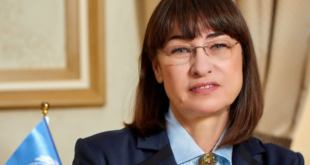Aleksandar Bodiroza*
What is the key to the well being of an entire population?
To answer this question, we need to travel 25 years back, when the global community gathered to discuss a response to the rapid population growth at the International Conference on Population and Development (ICPD) in Cairo in 1994.
Somewhere along the way during the conference, there was a paradigm shift, where talks merely about numbers started transforming into talks about people.
This discussion culminated in one paramount realization; women’s empowerment lies at the heart of sustainable development.
The ICPD corroborated that securing reproductive health and rights and women’s empowerment is the obligation of every country and community.
Today, as we celebrate World Population Day, we must recognize that gender equality is a precondition for securing the well being and prosperity of all people.
Let us also use the 25th anniversary of the ICPD to reflect on how choices and opportunities have changed for girls and women in Egypt since 1994.
Indeed, there have been a number of milestones in the advancement of women’s lives.
The maternal mortality rate dipped significantly from 83 per 100,000 live births in 1995 to 33 by 2015, according to the most recent data.
The number of women aged 20-24 who were married before their 18th birthday also dropped from 27% in 1992, to 17% in 2014.
The past two decades have also seen a decline in the prevalence of Female Genital Mutilation; a practice that was especially propelled into the spotlight at ICPD.
A staggering 98% of women aged 15-19 had undergone FGM according to the 1995 Demographic and Health Survey (DHS), compared to 61% of those aged 15-17 in the 2014 DHS.
While all of this is remarkable progress, the agenda of the landmark International Conference on Population and Development remains an unfinished one.
Out of 23.7 million women in reproductive age (according to a 2017 Census), around 1.2 million of whom have an unmet need for family planning services, which means hundreds of thousands are at risk of unintended pregnancies.
The female participation in the Egyptian labour force remains at 24%, according to a World Bank Study. Illiteracy among females is also at 31%, the same study says.
Moreover, over 99% of Egyptian women and girls reported experiencing some form of harassment in their lifetime. Three per cent of ever-married women age 15-49 years, have also experienced some form of spousal violence.
According to the latest 2014 DHS, a large percentage of ever-married women age 15-49 reported that they face challenges in accessing health care for themselves, with 7.3% said they have problems getting permission to seek healthcare, and 10.5% reported having problems getting money to seek treatment.
In 1994 in Cairo held conference, 179 countries adopted the ICPD Programme of Action, which called for all people to have access to comprehensive reproductive health care, including voluntary family planning, safe pregnancy and childbirth services.
It also recognized that reproductive health and rights and women’s empowerment are intertwined, and that both are necessary for the advancement of society.
We, therefore, are not looking to see a decline in the number of FGM or early marriage cases, or a decrease in the maternal mortality ratio in order to fulfil the Cairo promise. We need zero cases of maternal deaths, zero cases of violence and harmful practices against women and girls and zero unmet need for family planning.
This year, governments, UN agencies, civil society and even private sector organizations will gather in Nairobi, Kenya to advance the implementation of the ICPD Programme of Action.
Let Egypt lead by example and live up to the commitments pledged right in the heart of its capital 25 years ago.
*Dr. Aleksandar Bodiroza is the United Nations Population Fund Representative in Egypt
From: Ahram Online






